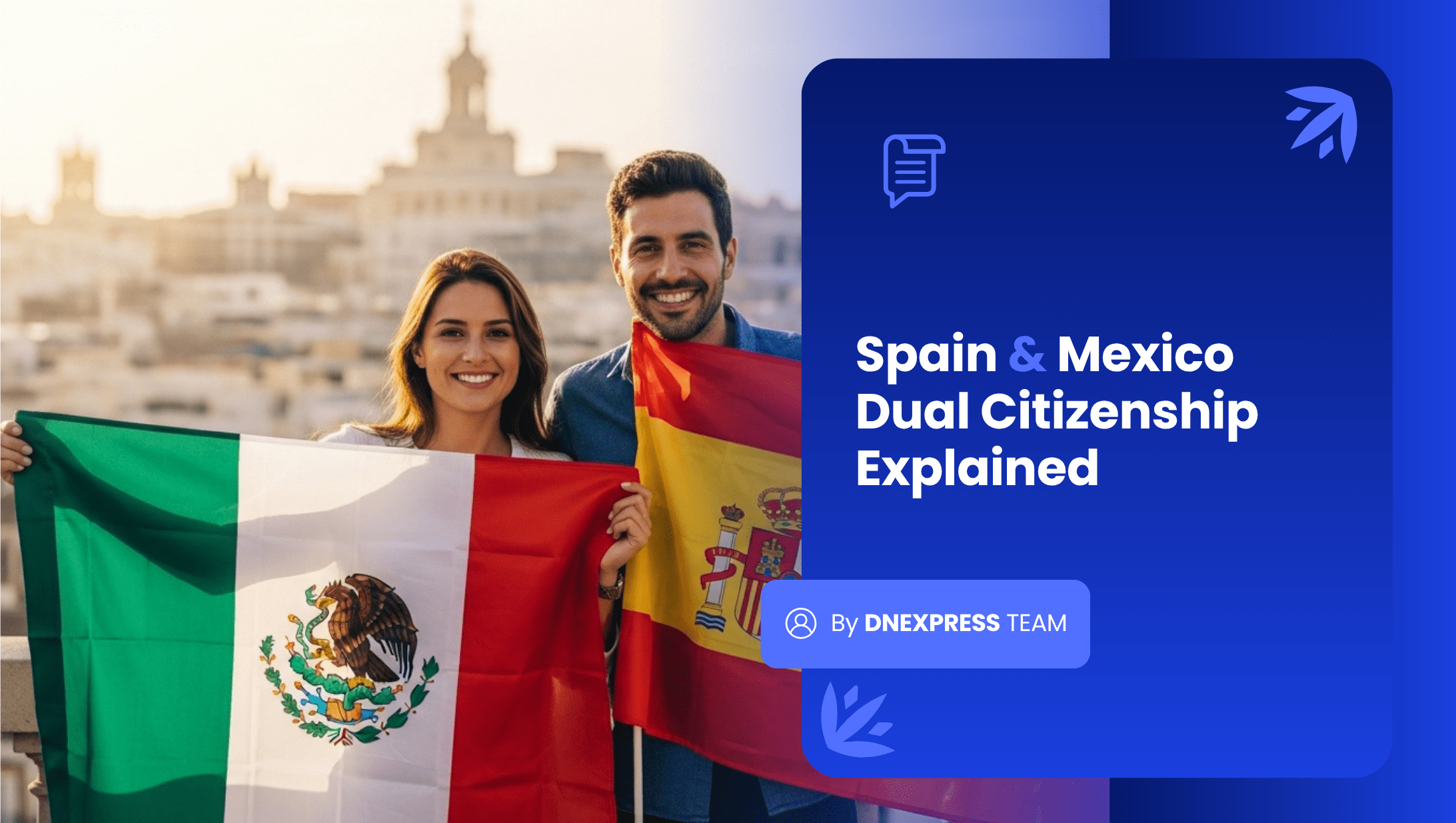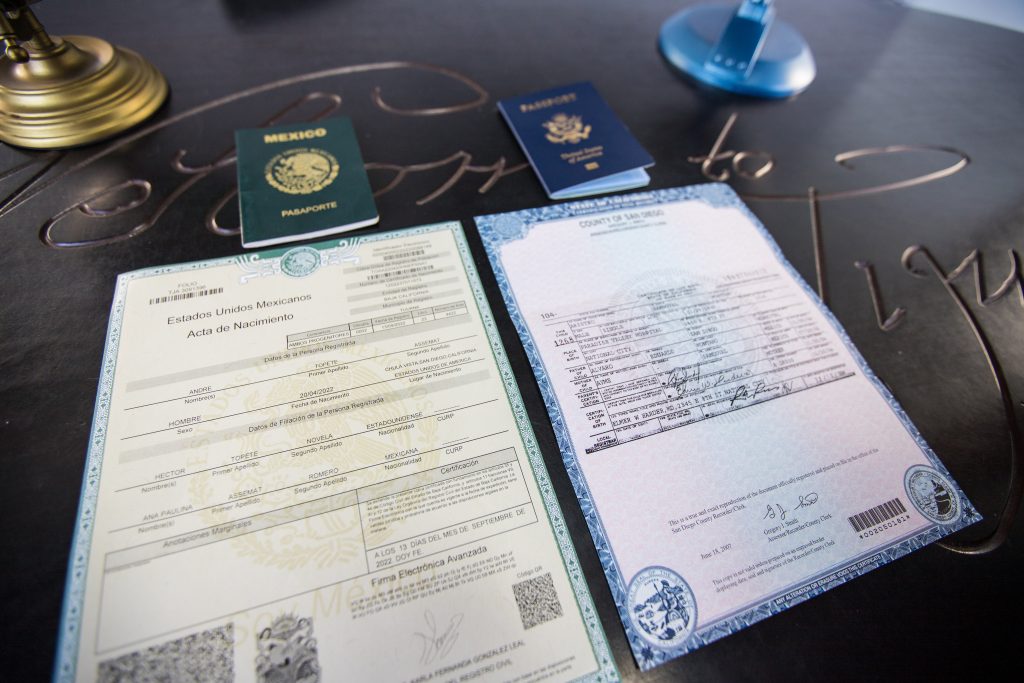
Yes, Spain allows dual citizenship with Mexico through a unique bilateral agreement that exempts Mexican citizens from the usual renunciation rule. But there's one key requirement, you must already be recognized as a Mexican national, even if you were born in the U.S.
Whether you're a second-generation Mexican American, reclaiming your nationality, or exploring strategic residency options in Spain, your path to Spanish citizenship starts with having your Mexican identity legally in place.
For U.S.-born applicants, that often means correcting documents, bypassing the consulate, or registering your heritage from scratch, and doing it the right way.
We help people secure their Mexican citizenship without setting foot in a consulate, so you can move confidently into Spanish residency and beyond. Everything we do is led by licensed Mexican attorneys, backed by years of cross-border legal experience, and designed to make dual nationality accessible, not frustrating.
Want to know exactly how Spain's dual citizenship with Mexico works, who qualifies, and how to avoid the pitfalls? We've got the complete breakdown below.
How Dual Citizenship with Spain Works for Mexicans
Spain's Agreement With Mexico (Convenio de Doble Nacionalidad)
Spain and Mexico share a unique bilateral agreement known as the Convenio de Doble Nacionalidad, which allows Mexican nationals to apply for Spanish citizenship without having to renounce their Mexican nationality.
This exception is part of Spain's broader policy that recognizes dual nationality with countries that share historical, cultural, or linguistic ties, including most of Latin America.
To qualify, you must already be a Mexican citizen, either by birth or by reclaiming your Mexican nationality through your parents or grandparents.
This is true even if you were born in the United States, as long as your Mexican citizenship is legally recognized, Spain will consider you eligible under this agreement.
In addition to having Mexican nationality, Spain requires applicants to live legally in Spain for at least two consecutive years. This is a major advantage over the typical 10-year residency rule that applies to most non-EU nationals. However, keep in mind:
- You must hold a qualifying residency visa (not all visa types count, more on that below).
- Your residency must be continuous, frequent travel outside of Spain can interrupt the timeline.

Ambiguities & Loopholes to Know
Here's where things get tricky, and where a lot of people get confused or even scared off. Spain's process includes an oath of allegiance, during which applicants are expected to “renounce their previous nationality.”
But for Mexicans (and other Latin Americans), this renunciation is widely understood to be symbolic.
In practice:
- Spanish authorities do not require you to cancel your U.S. passport.
- There is no verification process with the U.S. government regarding your status.
- You're asked to make a verbal pledge during your Spanish citizenship ceremony, no formal document renunciation is submitted.
Many of our clients have gone through this exact process and retained both their U.S. and Spanish passports with no issue. They enter Spain using one nationality and naturalize using another, legally and strategically.
Still, the language in the law can feel ambiguous, especially for those who've never navigated dual nationality systems before.
That's why legal guidance matters, particularly when applying as a Mexican-American whose citizenship ties span multiple countries.
Up next, we'll break down Spain's 2-year residency rule in detail, including which visa types qualify and what counts as “continuous residency.”
Residency Requirements for Mexican Citizens in Spain
How Long Do You Have to Live in Spain?
Thanks to the bilateral agreement between Mexico and Spain, Mexican citizens only need 2 years of legal residency in Spain before becoming eligible to apply for Spanish citizenship. This is a significant shortcut compared to the standard 10-year residency rule that applies to most other nationalities.
However, it's not about spending time in Spain, the type of residency matters. Here's what you need to know:
- Student visas usually don't count. Even if you've lived in Spain for years studying, it typically won't fulfill the legal residency requirement for citizenship.
- Work and family reunification visas often do count, as long as they're classified as long-term residency permits.
- Digital nomad visas are a gray area. Some are accepted, but only if they meet the Spanish Civil Registry's standards for continuous, legal residence, and that can vary by region.
To be safe, you'll want a visa that's tied to residence, not presence, and that's where legal strategy comes in. We guide our clients on how to structure their time in Spain and select the right residency category to avoid wasted years.

How Long Does the Application Take?
This is where many qualified applicants are caught off guard. Even though the legal requirement is only 2 years, the actual processing time for Spanish citizenship can take anywhere from 5 to 10 years, sometimes longer.
Why?
- Spain's Civil Registry is decentralized, which means timelines vary dramatically depending on the city or region.
- Staffing shortages and bureaucratic bottlenecks create long queues even for perfectly eligible applicants.
- Some applicants face delays due to documentation inconsistencies, especially if their Mexican documents contain errors or mismatched information from the U.S.
We've helped many clients clean up their legal identity before applying, ensuring their applications don't get rejected or delayed for preventable reasons.
If you're navigating this process alone, it's easy to underestimate the fine print. But with the right preparation and support, your timeline, and your outcome, can look very different.
Worries & Concerns
“Will I have to renounce U.S. citizenship?”
This is probably the most common fear we hear, and it's totally understandable. The thought of giving up your U.S. passport can be alarming. But here's the truth: Spain does not enforce the renunciation clause when it comes to Mexican nationals applying for citizenship.
During the oath, you'll make a verbal statement, but no documents are submitted to the U.S., and your U.S. citizenship remains intact.
Many of our clients now hold all three, Mexican, U.S., and Spanish, with no legal conflicts.
“What if I enter Spain with my U.S. passport?”
Totally fine. In fact, it's a common strategy. You can enter Spain using your U.S. passport for ease of travel or work permits, then switch to your Mexican nationality when applying for citizenship under the bilateral agreement.
Spanish authorities focus on your eligibility under the convenio, not how you entered the country. There's no cross-checking with U.S. immigration.
“Can I handle this myself?”
You can, but here's what most people underestimate: the paperwork maze, the document inconsistencies, and the regional variation in Spain's civil registries.
On top of that, if your Mexican documents aren't accurate or aligned with your U.S. identity, your application could get rejected or delayed for years.
That's why we built Doble Nacionalidad Express: to help people like you avoid the headaches, fix the issues before they become problems, and move forward with confidence. You don't need to go it alone, and you shouldn't have to.

Why Work with Doble Nacionalidad Express?
Most people think the hardest part of getting Spanish citizenship is the residency. But if you're not already recognized as a Mexican citizen, Spain won't consider you eligible under the bilateral agreement, no matter how long you've lived there.
That's where Doble Nacionalidad Express comes in.
We specialize in helping U.S.-born individuals of Mexican descent reclaim their Mexican citizenship quickly, legally, and without ever stepping foot in a consulate.
From there, we equip you with the clean, verified identity Spain requires to approve your citizenship application, without the mistakes or mismatches that lead to years-long delays.
Here's what makes DNExpress different:
- Remote Mexican Citizenship Services, Skip the consulate lines entirely.
- Licensed Mexican Attorneys, Genuine professionals. No shady middlemen.
- We Fix Broken Identities, Name mismatches, birth record gaps, and legal corrections? We've got it handled.
- Human Support That Responds, WhatsApp, phone, email, we're available when you need us.
- Strategic Legal Guidance, We help you understand which visa types qualify, which passport to use, and when to make the switch.
- Proven Success with Thousands of U.S.-Born Mexicans, Including clients previously denied or stuck in consular limbo.
We believe in empowering you with both the paperwork and the path forward, so you can navigate two countries, two systems, and two identities with confidence.
Ready to Claim Spanish Citizenship Through Mexico?

If you were born in the U.S. to Mexican parents, you might already be halfway there and not even know it.
The path to Spanish citizenship through Mexico is not only legal, it's actively recognized through a historic bilateral agreement. But like most things involving international law and identity, it all comes down to having the right documents, a clean legal identity, and a strategy that fits your life.
We don't help you “get papers.” We help you reclaim your rights, restore your identity, and step confidently into a future with dual (or even triple) citizenship, without confusion, delays, or costly mistakes.
Ready to see if you qualify?
👉 Schedule a Free Case Review
👉 Call or Message Us on WhatsApp
👉 Find Out If You Qualify in 5 Minutes
Your identity belongs on both sides of the border. Let us help you prove it.
FAQ
What passport should I use?
Strategically using both is common. Most people enter Spain using their U.S. passport for work, study, or travel, but apply for Spanish citizenship using their Mexican passport.
This leverages the Mexico-Spain agreement while preserving your U.S. ties. The key is knowing when and how to switch, and DNExpress can guide you through it.
Is it easy for Mexicans to get Spanish citizenship?
Easier than most nationalities, but not simple. The 2-year residency requirement is a major benefit, but not all visas count, and bureaucracy can still be slow or confusing.
It's a smoother path, but only if you have the right documents, timing, and legal support.
What if I wasn't born in Mexico?
You'll need to claim Mexican citizenship first. If your parents or even grandparents were born in Mexico, you may be eligible.
We specialize in helping U.S.-born applicants reclaim their Mexican nationality, without having to visit the consulate.
What are the downsides to the process?
The biggest issues are timeline and complexity. Processing delays can stretch up to 10 years. Mistakes in your documents or misunderstandings about visa eligibility can derail your case.
Without guidance, many applicants hit dead ends, or give up before they even start. That's why having experts in your corner matters.
Global citizenship trends show increasing numbers of people seeking dual nationality opportunities, with Spanish-speaking countries like Mexico and Spain offering significant advantages for those with cultural and linguistic connections to both nations.
The Instituto Cervantes recognizes these shared cultural bonds as foundations for stronger immigration pathways.



